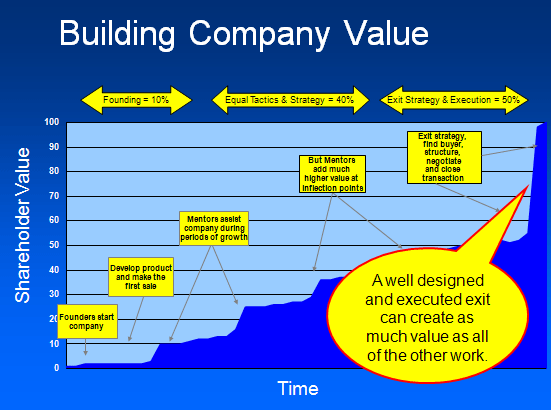This highly valuable concept is one of the most difficult for investors and entrepreneurs to grasp intuitively. I didn’t truly understand it until I was fifty. It’s not due to a lack of learning ability, but because, as with many lessons in life, it often takes dozens of experiences before the message sinks in. When those experiences involve selling a business, it can take decades to acquire the necessary wisdom.
One of the most important lessons for entrepreneurs and investors alike is that a well-designed and properly executed exit strategy can increase a company’s valuation by 50% or even 100%.
That’s right, the business valuation can rise by 50-100% simply through the process of selling the business.
Another way to think about it is that the exit transaction, which happens at the very end, can generate half again as much value as all the years of hard work that came before. For instance, if you build a company over three or four years that’s worth $10 million by standard financial metrics, a well-planned and executed exit could sell it for $15 million, or even $20 million. This isn’t a fluke, it happens frequently, provided the exit is well designed and executed.
It may not seem intuitive, which is exactly why this discussion is worth having.
My First Business Sale – Nexus Engineering
The first time I witnessed this 50% valuation boost was when we sold the company I co-founded in graduate school, Nexus Engineering. We sold it for about 50% more than anyone expected. Initially, I thought it was luck. But after seeing the same 50%+ increase many more times, and talking with dozens of experienced founders who had sold multiple businesses, I realized that this outcome is not just common, it’s something to be planned for.
Value Is Not Created Linearly

To understand how extra value is created through an exit, it helps to recall that shareholder value doesn’t increase in a smooth, linear fashion. Instead, major jumps occur at key strategic milestones. These steep rises happen when significant strategies are successfully implemented, things like strategic partnerships, acquisitions, new locations, or new product launches.
Such initiatives typically add more to company value than the day-to-day operational work most employees focus on. A well-crafted exit transaction is the final and often largest of these strategic value jumps.
Markets for Selling Companies Are Very Inefficient
The market for selling businesses is extremely inefficient, which is one reason a well-managed exit can lift valuation by 50% or more. The inefficiency comes from several factors:
- There are very few buyers and sellers.
- The market is illiquid.
- Information is difficult to access.
In contrast to highly efficient markets like residential real estate or NASDAQ trading, business sales are opaque and fragmented. This inefficiency is a key reason why a smartly structured sale can capture a much higher valuation.
Strategic Value Differs Between Acquirers
Another major factor behind the valuation increase is the variability in strategic value, the premium one acquirer might see over another. Strategic value represents the added worth a buyer perceives because the acquisition enhances their own business in unique ways. Understanding, uncovering, and communicating that value to each prospective buyer can dramatically affect the final sale price.
Selling a Business Well Requires Multiple Bidders
A successful exit strategy must include a competitive bidding process. Multiple bidders provide leverage, predictability, stronger negotiation power, better governance, and ultimately, a higher sale price. An active auction dynamic is essential to realizing that extra 50% valuation boost.
Great Business Brokers Can Make a Big Difference
Companies are sold, not bought.
Because of the size and complexity of such transactions, there’s often a sense of mystique around selling a business. Yet, at its core, it’s still a marketing and sales process, although the most complex one there is. Decisions are made by people, and people are influenced by the skill of those presenting the opportunity.
The quality of the business broker or M&A advisor can have a profound impact on the final valuation. The best brokers consistently deliver exceptional returns, regardless of their cost. Their expertise can easily contribute to that final 50% or greater increase in sale price.
Case Study – Parasun
In my BC Tech Fund portfolio, I invested in nine companies. Within three years, three of them achieved liquidity events, one went public and two were acquired. This was not a coincidence but part of the portfolio strategy. I specifically chose companies that could execute early exits and worked closely with their boards and CEOs to make those sales successful.
Public Company Examples
Private company data on exit-driven valuation increases is scarce and often difficult to quantify. That’s why many entrepreneurs are unaware of how significant the impact can be. However, similar patterns appear consistently in the public markets, where it’s easier to measure valuation changes around acquisitions and mergers. These examples reinforce that a well-executed sale can boost value by 50% or more.
Summary
For both entrepreneurs and investors, the key takeaway is clear: when you sell a business, a well-designed and executed exit strategy can increase the company’s valuation by 50% to 100%. Mastering this final step can be the most profitable move in your entire entrepreneurial journey.
